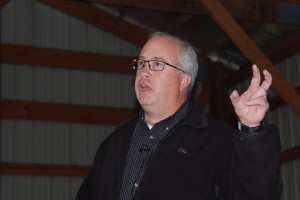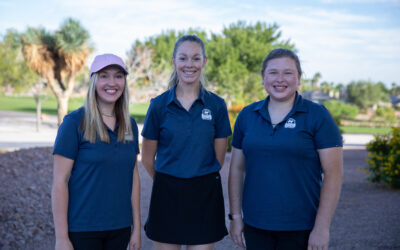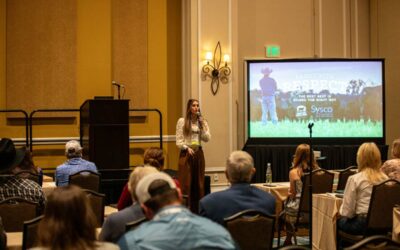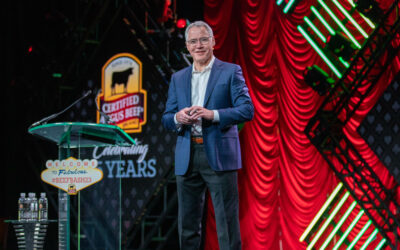
Every story has a number: -2.26
You might say it’s an even number, divisible by 2. But what relevance can we find in -2.26, a negative carried out to two decimal places?
You’d never guess it unless you just read the article, but that’s the estimated “own-price elasticity” of the Certified Angus Beef ® brand.
Still, that does not clarify it much for most of us. After many conversations with Missouri economist Scott Brown last year, I think I can help explain. He worked with graduate student Jillian Steiner to produce the ground-breaking white paper, “Should beef quality grade be a priority?”

But it will never be an easy number to chat about.
It’s a key measure of demand, which can be relatively more — or less – elastic. If the number comes out to an absolute value less than 1, it is often called inelastic.
To make it cloudier, there’s a paradox here. Premium priced goods are typically considered luxuries with fairly elastic demand (like -2.26). But beef is a perishable good, and further affected by its price/value relationship: as you pay more, you are more keenly aware that “you get what you pay for.”
Prime demand is very similar to that for CAB, according to the Missouri study, both luxuries that defy their elastic demand estimates (Prime at -2.33) to increase sales as prices move higher.
On the other hand, Select beef has a -1.24 elasticity, which is closer to inelastic, but in the protein market dynamic, it is the most vulnerable to substitution or a switch to pork or poultry.
The other fun side of this research is called “price flexibility,” calculated by simply dividing 1 by the elasticity number. Prime price flexibility is -.43 and it is -.44 for CAB, but -.81 for Select.
So what? So, the closer to 0, the less impact on price when production goes up. You have probably heard some concern about how much more premium beef this market can take, and maybe we should ramp up more Select beef.
Not according to demand data. To do the math and illustrate with a huge change in supply for a very dramatic effect, let’s compare a 50% increase in supply of Prime versus Select beef. Prime cutout last week was $238 per hundredweight and Select was $207, a spread of $31. CAB was $227 by the way, if you want to do the math in the example below.
That increase in Prime supply would mean 50% of -.43, or a 21.5% reduction in price to net just $187, but 1/-1.24 equals the -.81 price flex number for Select, and 50% of that is a 40.5% reduction in price to net just $123, so the spread would more than double to $64.
In the unlikely event that you crave more numbers from this study right now, there are many more in the links to the study provided above!
As we build our herds, it is even more unlikely we will produce 50% more beef anytime soon. But the numbers say the best way to build a future with sustainable beef prices is to aim high, for Prime and CAB.
–Steve
PS — You can follow along as we blog our way through November. Here’s what you may have missed in our “Every number has a story series”:
Day one: $6.93
Day two: 2.5 million
Day three: $204.10
Day four: 12.1 million
Day five: 11/13
Day six: 8 million
Day seven: 139
Day eight: $39
Day nine: 30.1%
Day 10: 120 million
Day 11: -2.26
Day 12: 12 to 15 minutes
Day 13: 30%
Day 14: 32 million
Day 15: $154,000
You may also like
$100,000 Up for Grabs with 2024 Colvin Scholarships
Certified Angus Beef is offering $100,000 in scholarships for agricultural college students through the 2024 Colvin Scholarship Fund. Aspiring students passionate about agriculture and innovation, who live in the U.S. or Canada, are encouraged to apply before the April 30 deadline. With the Colvin Scholarship Fund honoring Louis M. “Mick” Colvin’s legacy, Certified Angus Beef continues its commitment to cultivating future leaders in the beef industry.
Raised with Respect™ Cattle Care Campaign Launched This Fall
Raised with Respect™ was developed as part of a strategic cattle care partnership between Sysco and CAB. The collaboration focuses on supporting farmers and ranchers, equipping them with continuing education to stay current on best management practices and helping to increase consumer confidence in beef production.
Drought Impact and Cattle Industry Dynamics
As drought conditions persist across much of cattle country, farmers and ranchers are at a pivotal juncture in the cattle industry’s landscape. What impact does this prolonged dry spell have on the nation’s herd numbers? When will heifer retention begin? How will industry dynamics influence the spring bull sale season?



